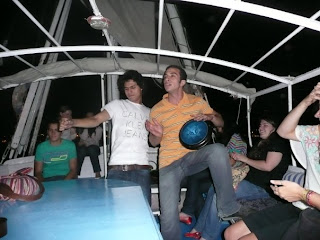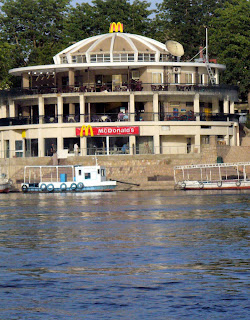So this is going to be a long one. Feel free to chose a section--separated by pictures instead of reading this all....I'll break it down by day.
The night before we went to the bus station and bought tickets and 6a.m. the next morning found us snoozing on a public bus with the beach becoming ever-nearer.
Though only about 1 hour outside Cairo, the trip took around 3 hours because it drove to the Suez canal first, which was just fine with me.
It is strange but seeing the Suez canal was almost as exciting for me as seeing the pyramids. I snapped a bunch of awful pictures through the dirty bus windows. I kept thinking about learning about it in Mr. Bergman's? Mr. Lee's? class in HS. All the drama that thing caused...unlike the pyramids, I never had a clear image of what the canal would look like. It was extremely satisfying to be before something I learned about in HS.
It was the last bus stop. Welcome to Ain Suchna!
Somewhere along the way the others had decided it was Lily-practice-her-Arabic-day. That was pretty much fine with me. I asked a guy when the evening buses was and which way the town was and we set off walking down the desert roads, mountains on our right, the sea on our left.
And we kept walking.
...and kept walking.
Hey guys....? maybe we should ask how much further at one of these resorts?
Unfortunately we didn't know the word for town and they didn't speak English. We borrowed some transliterated phrases from the back of my guidebook and learned--gasp--there was no town. Just beach resorts.
After renting a flat for the day so we could use the beach, our next adventure, a search for sustenance, began.
There's a fish restaurant a few kilometers down that way, the man who rented us the flat pointed.
30 minutes later, many half understood conversations (fein matum?? --where's the restaurant?) and very hungry we sat down in a garden and were handed menus, completely in Arabic.
Chicken we asked? salads?
La, bes semack. (No, only fish.) Then fish it was for all.
But then something strange happened.
"Mish semack."
We stared blankly. What. No. Fish.
Turned out they caught fish daily and the boat wasn't back yet.
We bought crackers and chips and a joint next store--the only of its kind in the vicinity and trudged back to our spot on the beach.
where we preceded to soak up the sun
and parting the red sea....(Rami later said really isn't =( )
wait what does that number end with?
Sullivan.
And he was not happy.
FEIN!?!?! WHERE ARE YOU!?!?!
While we thought we were taking the initiative to make the most of our day off he thought we were taking undue risk using public transportation, not briefing him of our plans and the cause of his morning of anxiety.
We took the earliest evening bus home flawlessly.
While I understand he feels responsible for us I also strongly believe breaking into smaller groups and doing things independently is essential for learning about Egypt; after all the goal of this program. We didn't want to take our attention-drawing-tourist vans, we wanted to travel like Egyptians.
Sunday I volunteered at the after-school program in Maqatum. Here are some pics, any I'm in taken when children hijacked my camera.
Monday after our usual four hours of Arabic we had another dialogue after which most of us went on a felucca with our new Arabic friends.
 Afterward about ten of us rode horses into the desert toward the pyramids. We had feisty horses and inexperienced riders so didn't make it very far, but it was one of the best things I've ever done it my life.
Afterward about ten of us rode horses into the desert toward the pyramids. We had feisty horses and inexperienced riders so didn't make it very far, but it was one of the best things I've ever done it my life.It was after midnight, the stars and moon shone and the pyramids waited majestically in the distance. We could hardly see in front of us--the desert and dunes stretched out into nowhere but I felt safe and content to enter that nothingness.
It felt great to be on a horse again, mines name was Gamela meaning beautiful, and I was so happy to be out with new friends and what at this point feels like old, doing something new.
Today I left Arabic class early for orientation at St Andrews, a multi faith church which sponsors programs for refugees. Five other students and I have were selected to tutor English to adult refugees Tuesdays and Thursdays there for the next two weeks. --Which was a shock--only two weeks left in Cairo--It's going way too fast for me...
After orientation and then a two hour break, where Julia and I took the metro for the first time--seemed cleaner and better organized than most in the states--to AUC for coffee and HW, we entered the small library where other students and tutors were busily conversing.
While waiting for more tutorees I read Where the Wild Things Are and and a Dr. Seus book, Dr. Brown Can Moo Can You? to Maria, a 13-year-old Sudanese refugee. Her older sister was working to another tutor and I sat down and started talking with her. She spoke almost no English so our reading, which Julia participated in too was a combination of Arabic, gestures, sounds and quick dives into the dictionary. This is the way I like learning Arabic best...
After she left, I worked with a 23-year-old named Suleyman from Senegal. Suleyman had to explain to me where it was and then deal with my mililildjfdin questions that followed.
We talked about so much--concepts of family, religion, culture, opportunity, community--he gave me so much to think about.
For example, why do we--i.e. me, westerners, value independence to the extent we do? If you came to my town, he said, every one would notice, they'd come to my house and welcome you and want to know all about you. Cairo, which is the most family oriented place I've seen, seems disconnected and lonely for him.
Btw he loved America, was wearing a NY jersey and when he left I saw a Bob Marley backpack swinging from his shoulders.
And just to make this day even better--I ate vegetables for dinner, which besides two 'lil siblings, a buff bro a couple parents and my many loves in Boston and beyond--i.e. China--are what I miss most here.

